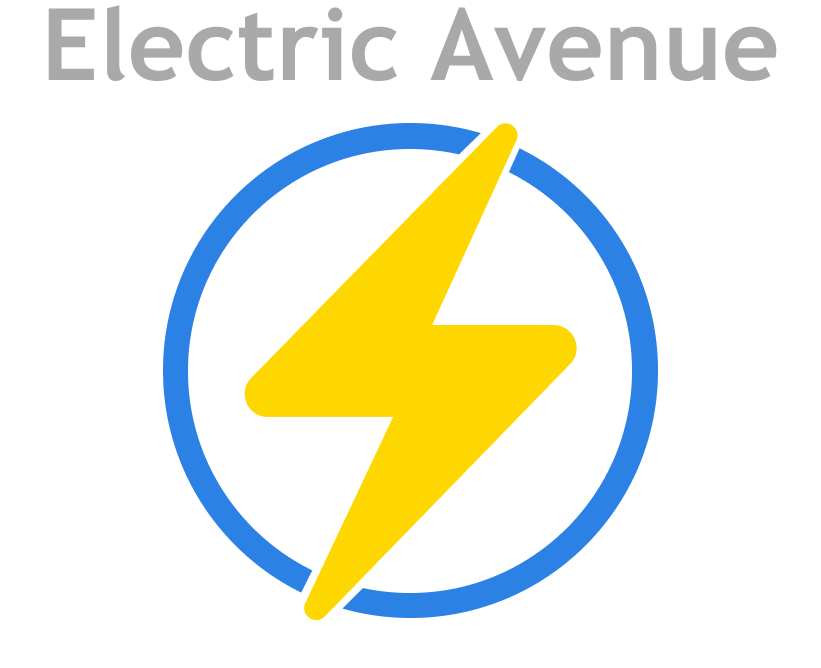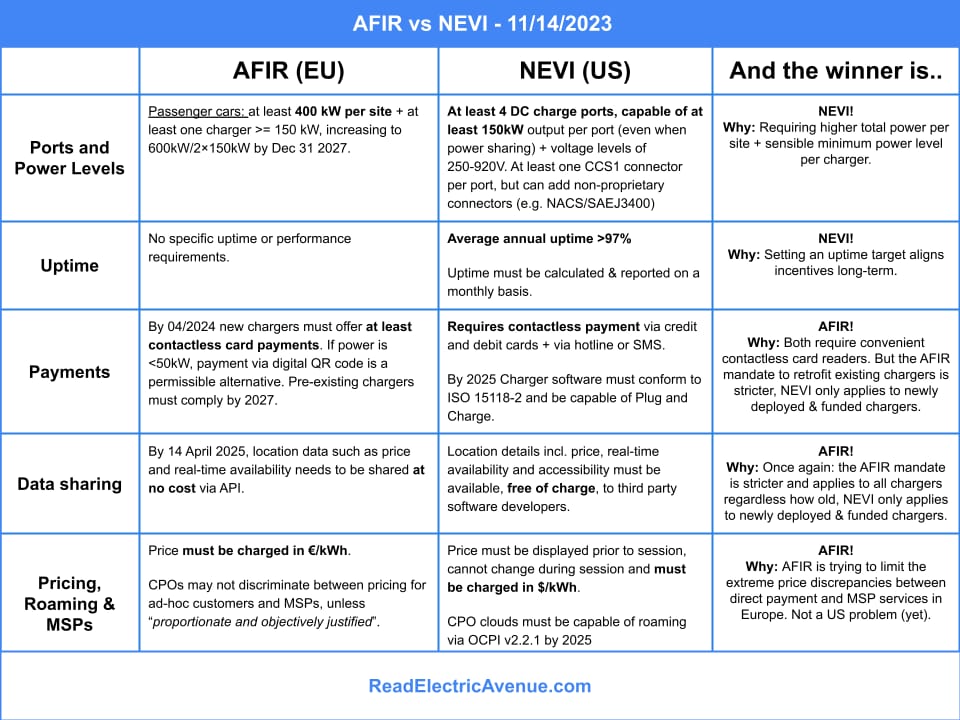Happy Monday. This is Electric Avenue, where we serve up EV charging knowledge like a master barista—strong and to the point. ☕️💪⚡️
Here’s what we have for you today:
Battle of the abbreviations - AFIR vs NEVI ⚔️🤺
3 Links 🔗
Meme of the week 🤡
Not subscribed yet? Sign up here 👇🏼
Let's dive in!

Battle of the abbreviations - AFIR vs NEVI ⚔️🤺
Today, we're doing something crazy… We’re comparing minimum standards for an incentive program with a mandate… across two continents!!!
That’s right - it’s the US 🇺🇸 National Electric Vehicle Infrastructure (NEVI) minimum standards vs. the EU’s 🇪🇺 Alternative Fuels Infrastructure Regulation (AFIR).
It’s SUV vs. bicycle, it’s Hot Dog vs Bratwurst… heck, it’s Football versus Soccer!!!
Say the Europeans: “Wait, what the heck is a NEVI?”
NEVI is a program by the U.S. Federal Highway Administration (FHWA) that will provide funding to strategically deploy charging stations along designated FHWA Alternative Fuel Corridors (AFCs). Funding is available for up to 80% of eligible project costs, including:
The acquisition, installation, and network connection of EV charging stations to facilitate data collection, access, and reliability;
Proper operation and maintenance of EV charging stations; and,
Long-term EV charging station data sharing.
EV charging stations must be non-proprietary, allow for open-access payment methods, and be publicly available or available to authorized commercial motor vehicle operators (read: truck drivers) from more than one company.
Say the Americans: “Wait, what the heck is an AFIR?”
The new Regulation for the deployment of alternative fuels infrastructure (AFIR) sets mandatory targets for public charging stations along the trans-European transport (TEN-T) network. AFIR also paves the way for a user-friendly charging experience, with full price transparency, common minimum payment options, and coherent customer information across the EU.
So, what are the major differences and how do they stack up?
The Winner: AFIR 🇪🇺 3:2 NEVI 🇺🇸
So there you have it folks: AFIR beats NEVI by 3:2. Let’s break the match into the main points from the above illustration.
Ports and Power Levels: NEVI wins as it requires a higher total power per site and a sensible minimum power level per charger
Uptime: Once more NEVI scores 🥅. Setting an uptime aligns incentives long term.
Payments: AFIR is getting started. Both are fairly similar standards, but AFIR mandates retrofit to existing infrastructure wheres NEVI only applies to newly built and funded sites.
Data Sharing: AFIR is getting heated 🔥. Again a close match but AFIR is stricter once more and requires data sharing from existing infrastructure as well.
Pricing, Roaming & MSP: Last-minute goal for AFIR ⚽️, the match is over. AFIR tries to limit extreme price discrepancies between direct payment and roaming via EMSPs (most likely because is more of a topic in the EU, and not yet in the US).
You know what that means: It’s football, stop calling it soccer…
But of course that’s just our opinion. What do you think?
Which charging infrastructure framework is better - AFIR or NEVI?
Let us know and we’ll feature the poll results next week!

3 Links 🔗
VW launches Bidirectional Charging for V2H⚡️🔄 🚗 : It’s finally here! VW announced this week that vehicles on the MEB platform (e.g. ID4, ID5) with a 77 kWh battery, will receive the ability to discharge energy with the new software version (3.5 or higher). Initially, bidirectional charging will be compatible with HagerEnergy’s DC home power system only and applied for the vehicle-to-home (V2H) use case. The feature comes about a year later than originally promised at the VW Power Day in 2021. We’ll keep an eye on this and update you once we know more about the cost and availability of compatible DC chargers.
Tesla Supercharger in Europe compatible with fleet fueling cards 🔌 🛜: After the initial integration with Chargemap, the superchargers are available for DKV Mobility and Fleetcor Travelcard customers within their service. As the user journey is based on the Tesla App (users need to store their roaming card as a payment method in the Tesla app - see screenshots), we assume that Tesla's primary intention, for now, is to enable Tesla fleet vehicles to use the SuC network with their fleet service.
Getting off the ground: The first 17 sites of GM’s charging network are open (white-label operated by EVGO). At least 25 locations are offering 100 fast-charging stalls by the end of the year; approximately 200 locations are targeted by the end of 2024. Pilot and Flying J travel centers across the US feature 24/7 amenities, including 350kW chargers, and onsite staff monitoring.
☔ 35% of the stations activated so far have a canopy (via Steve Birkett)
↕ 29% have pull-through stalls for larger EVs + towing
🥊 65% are within 10 miles of an existing Electrify America (EA) station
💲 Pricing ranges from $0.55-$0.62 per kWh, so you pay a little extra for the convenience factor (as with Interstate gas stops)
Most-clicked link last week: Hagerty Media’s video of the 2024 Tesla Cybertruck Review (Link)

Meme(s) of the Week 🤡

CPOs trying to understand NEVI and AFIR
🤣🤣🤣
That's a wrap for this week! Let us know how you feel and leave some feedback (We read every single one of these 🙂 ):
Reader Review of the Week
Selected ⚡️⚡️⚡️⚡️⚡️ Freakin´ awesome on ⚡Tesla Powershare, Cybertruck and Chargemap CPO portal and wrote:
“fcking awesome newsletter guys. good job”
What do you think of today´s edition?
Someone forwarded this to you? Subscribe now - it's free!
DISCLAIMER: None of this is financial or tax advice. This newsletter is strictly educational and is not investment advice or a solicitation to buy or sell any assets or to make any financial decisions. The Electric Avenue team may hold investments in or may otherwise be affiliated with the companies discussed.





